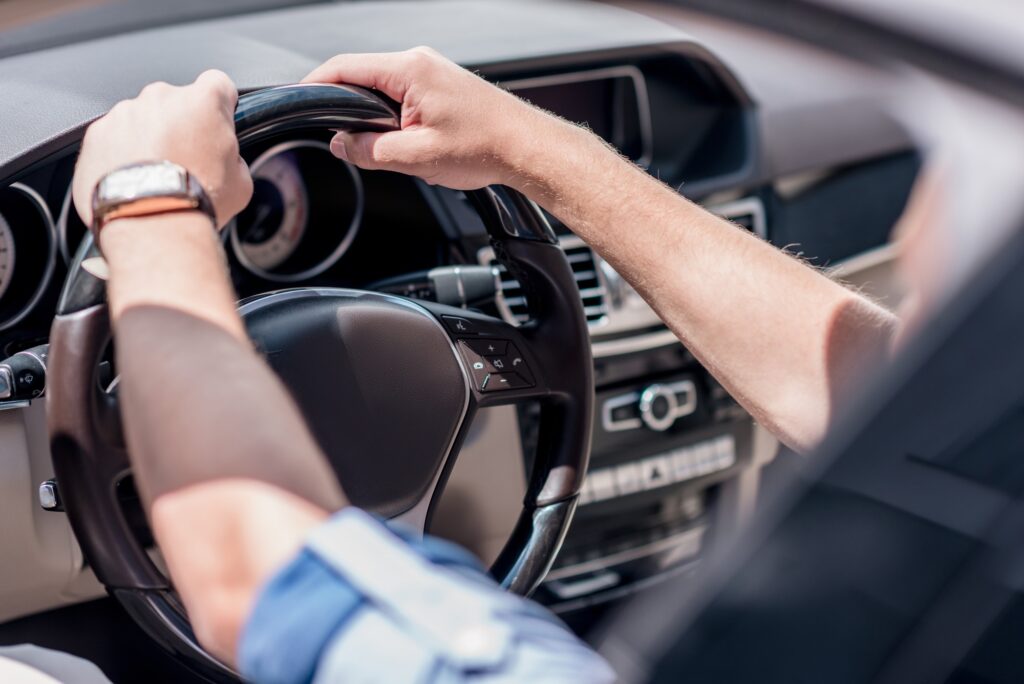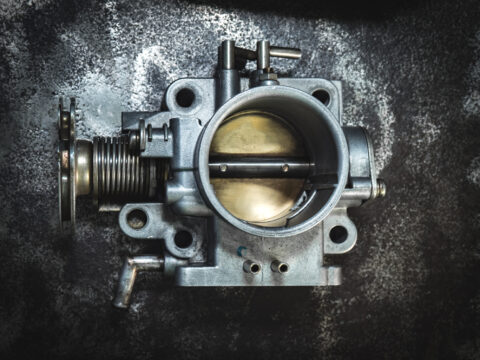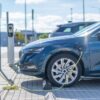Routine maintenance keeps cars functioning correctly. But it doesn’t permanently eradicate malfunctions. For example, you’ve probably heard of the ultimate car nightmare – a car shutting off while driving.

Cars shut off while driving primarily due to fuel system issues. However, it is possible for other factors to be at play. Read on to discover why your car shuts off while driving and how to fix them.
What Would Cause a Car To Shut Off While Driving?
Here are some reasons behind your car shutting off while driving.
Fuel Doesn’t Reach the Combustion Chamber
Fuel powers the engine to function at optimum levels. So when it clogs and fails to reach the combustion tanks, your car can easily shut off. This scenario can occur because of the following reasons:
Faulty Fuel Pump
An effective fuel pump should transfer fuel from the tank to the carburetor or injector. This way, it keeps the fuel pressure above an appropriate level.
When the pump is faulty, the fuel pressure remains below the required amount to start the engine, and your car can shut off randomly.
Empty Fuel Tank
Your car can simply shut down because its gas tank is empty. This situation occurs primarily when your gas gauge is faulty. This way, you can’t know the actual fuel amount in the car.
Faulty Alternator
Fuel alternators produce constant streams of electricity from the car’s mechanical energy. As a result, it runs different electrical parts such as stereo, dome lights, and conditioning units.
It also charges the car battery. So, if the alternator is faulty, your car gets insufficient electrical energy, and the battery dies.
You’ll usually get a flashing dash when your alternator is faulty. So, pay close attention to notice when your car begins to receive intermittent power.
However, you can still test the alternator out using the following tips:
- Leave the car engine running for some minutes.
- Turn off all the lights, including the stereo and dashboard.
- Use a multimeter to test the battery.
- Check your test results.
Healthy alternators produce 13.1V and 14.1V at idle speed. If the test results indicate your faulty alternator, contact a professional for further assessment.
Insufficient Air Delivery to the Engine
Your engine may receive insufficient air because of the following reasons:
Faulty Throttle Body
A throttle body controls the engine power by regulating the fuel supply. When faulty, it allows insufficient air into the gas engine, leading to random shut-offs.
Clogged Air Filters
When the air filters get clogged, it leaves a small space for air to enter the car engine, leading to shut-offs.
Malfunctioned Sensors in the Electronic System
Modern car models highly rely on electrical systems to function correctly. But, these systems can malfunction and lead to shut-offs because of the following reasons:
Faulty MAF Sensor
MAF sensors control the air delivered into the engine system. Below are some of the things that indicate your mass airflow sensor is faulty:
- Increased idle speed.
- Misfire in any of the cylinders.
- Erratic surge or speed change.
- Extremely high fuel combustion.
Faulty MAP Sensor
The manifold absolute pressure sensors measure the atmospheric pressure within the intake manifold. Its signal helps calculate the MAF and fuel injection. So, the engine remains prone to malfunctions when the MAP is faulty.
Malfunctioned Ignition Switch
A faulty ignition switch and dead batteries are common causes of car shut-off while driving. When your ignition switch malfunctions, it fails to turn on or off other electrical components such as the radio, interior lights, and dashboard.
In addition, your car may also experience problems with the power door locks and airbag system. Eventually, the headlights and stereo fail to operate.
Your car battery’s health also affects its ignition system operations. So, if your battery dies after staying unused for a long time, you could be dealing with a parasitic drain problem.
Faulty Spark Plug
A spark plug is a component of the ignition system. Once it malfunctions, you’ll have to repair it for your car to start working because it doesn’t have a fuse.
This plug malfunctions when its metal electrodes fail to heat up, thus, no currents get transmitted to the cylinders, and your car remains shut off.
Once you notice any stalling when driving your car or even idling, contact a mechanic to inspect its spark plug. Sometimes, the stalling occurs because the plug is dusty and can’t allow enough air into the cylinders.

Malfunctioned Engine Control Unit (ECU)
The ECU operates under signals generated by various sensors in the car. For instance, its coolant sensors measure engine temperature, and the engine shuts down when it malfunctions to avoid overheating.
Fuel Leaks
Fuel leaks quickly empty your gas tank. So, once your car shuts off while driving, check for signs of fuel leaks. First, check for any gasoline puddles underneath your vehicle.
Excessive strain or hard start when starting your engine are also common indications of fuel leaks.
Charging System Issues
The charging system powers your car’s electronic parts, such as fuel injectors and computers. So when it has any faults, your car shuts off while driving. These issues include loose cables in the charging and broken alternator belts.
The alternator may also undercharge or overcharge and disable the vehicle’s operations.
Faulty Ignition Coil
The ignition coil fits over the top of the spark plug. It creates high voltage charges to ignite fuel in the engine cylinders. When the ignition coil fails, your car may experience misfires.
However, ignition coil issues vary with models. It also depends on the engine size. So once you notice these issues, contact a mechanic for remedies.
How To Fix a Car That Randomly Dies While Driving
Now that you understand the common cause of cars shutting off while driving. Here are some tips on how to fix the issue.
Replace the Faulty Spark Plugs
Since spark plugs don’t have fuses, your mechanic will always advise you to replace them when they malfunction.
The new spark plug will eradicate gaps and worn-out areas that may have led to the shutdown.
Check Trouble Codes
The older car models didn’t require much work to diagnose the shutdown problems. You only needed to use a multimeter. The built-in diagnostic software in modern vehicle models detects engine problems and stores the information in the fault codes.
So you don’t need to measure the engine with a multimeter. Instead, check the trouble codes for a correct and quick diagnosis.
You’ll need an OBD2 scanner to read the trouble codes. So, buy the scanner or visit your mechanic to solve the issue.
Fill Your Fuel Tank
Since empty fuel tanks are common causes of cars shutting down while driving, filling the tank remedies this issue. Your fuel gauge may say the fuel level is correct even when it isn’t. So filling the tank should help you overcome car shut-offs caused by a faulty fuel gauge.
Check Alternator Voltage
This fix applies when you can’t check trouble codes. First, you’ll need to leave the car engine running to get an accurate reading. Then, use a multimeter to measure the voltage.
The faulty alternator requires repair or replacement if you get a reading below 12.5 V.
Check the Dashboard
Once your car shuts off, check the lights on the dashboard. The ignition switch may be faulty if they turn off upon shutting off the engine.
However, the issue could also come from a low battery voltage. So, inspect the ignition switch and the battery to identify the problem.
Check the Sensor Data
Sometimes the issue may originate from the car engine sensors. So, if you couldn’t find any problems after checking the trouble codes, check the data from all sensors.
First, find a diagnostic tool compatible with the engine control module. In addition, get a repair specifications manual for your care before beginning the process. The manual will help you understand the kind of readings to expect from the sensors.
Check the Tachometer
Some car models have a tachometer that receives data from the crankshaft position sensor. So, if these meters don’t work or move when the car engine starts, the problem lies within the crankshaft position sensor.
What Should You Do When Your Car Shuts Off While Driving?
If your car shuts off while driving, follow the steps below to find help:
- Move the car to the roadside: It may seem complicated with no brakes and steering wheel power, but you can still use the coast to a stop or low gears. If it is too difficult to slow down, move to a safe area and use emergency brakes.
- Try restarting the car: If it shuts down completely, it may not turn on, and you’ll have to get professional help.
- Turn on emergency flashers: Emergency flashers will alert other drivers of your issue, and you’ll help.
- Call a mechanic: Investing in a trustworthy mechanic is an asset for car owners. In this case, you need reliable car maintenance personnel to get to your location. However, you could opt for towing services to get the car to the nearest repair shop.














